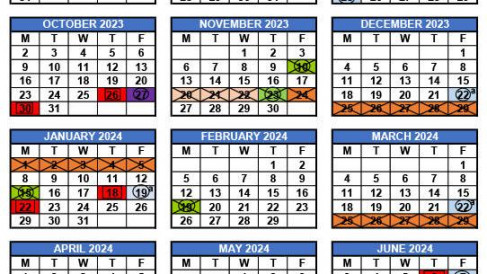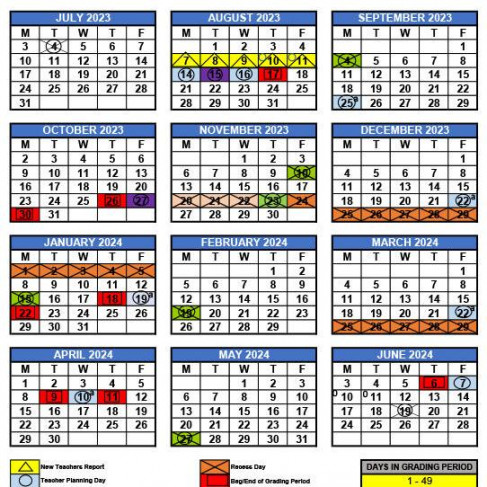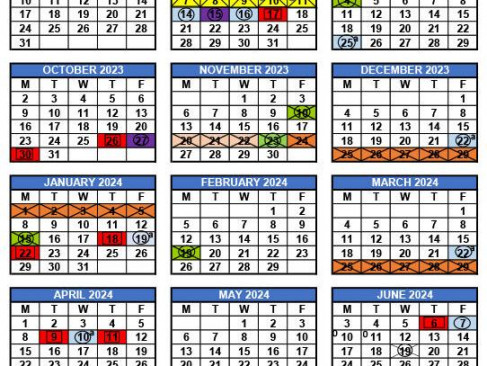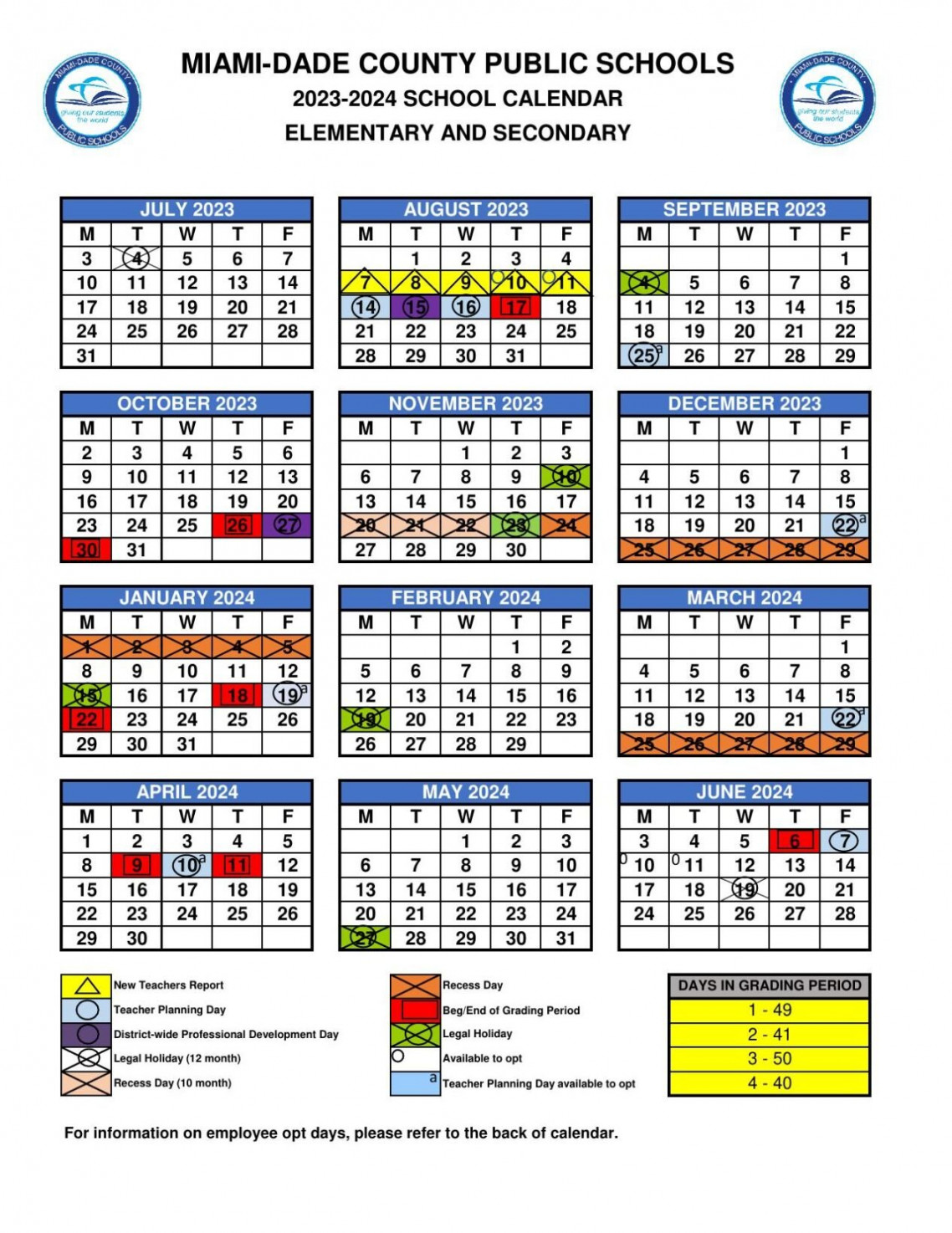2024 And 2025 School Calendar Miami Dade
‘I was them’: Miami-Dade schools develop new programs for thousands of immigrant ‘newcomer students’
Very little to none.

That’s how much English Yuneisy Morell’s students had when they walked into her classroom on the verdant, tree-lined campus of Ponce de Leon Middle School in Coral Gables. When she taught summer school this June and July, all of Morell’s kids were “newcomers.”
“They have been here for three to four months,” Morell explained. “Their personal journeys to get to the United States have put me to tears. And many of them don’t even have their mom here. And many of them are missing their sisters … that is the hard part.”

This past summer, students at Ponce de Leon Middle took some of their first steps into the English language and life in the U.S., as part of a new summer program just for immigrant students.
Haider came to Miami from Peru. He’s 14 years old and in eighth grade, with curly hair and an easy smile. WLRN is using just his first name to protect his privacy.

“The summer camp is so good because I like my friends and my teacher is so cool … yeah,” Haider said with a smile.
MDCPS rolls out newcomer-focused instruction

Thanks to students like Haider, this past school year Miami-Dade County Public Schools saw an increase in enrollment — rather than a loss — for the first time in decades.
One reason: immigration. The district is now serving an additional 20,000 immigrant students — many of whom came with their families from across Latin America, fleeing economic crises, political repression and rampant violence in their home countries. The influx is greater than when Hurricane Maria struck Puerto Rico in 2017 and the 2010 earthquake in Haiti.
The Miami-Dade school district — the country’s third largest — has been rolling out new strategies to support these students, including an English language immersion program over the summer, and an effort to group newcomer students together when possible, so that they can find comfort in their shared experiences.
The summer school program allowed students like Haider to be surrounded by kids just like him.
Morell knows firsthand the difference that can make. When she was younger, she herself was in classes to learn English for Speakers of Other Languages or ESOL.
“I was them,” Morell told WLRN. “I came from Cuba when I was 10. So my experience as an ESOL learner … I think I kind of channel that in the classroom. And it’s just showing them my experience and telling them — I did it. It’s possible.”
Almost three decades later, Morell is trying to be the mentor she needed when she had just arrived.
“We …” Haider said haltingly.
“Go! You’re doing great. I’m loving it,” Morell cheered him on. “Go!”
“In the summer camp, I speak more English,” Haider said, slowly but steadily stringing one English word after another. “I … I read more. And it’s so cool because I have my teacher and my friends.”
After getting that sentence off his chest, Haider’s face lights up with a huge grin. His mom Jessica says this program has helped him adjust to his new life in the U.S.
“Yeah. He have more confidence,” she said. “He feel more comfortable talking about the experience here because he … very happy for the summer camp because he learning so much.”
And his English has improved substantially, she says.
“He understand everything. But don’t sometimes spell very well,” she added. “But he understands all by heart.”
District braces for more newcomers
Heading into the 2023-2024 school year, Miami-Dade County Public Schools officials said they would carry over some of the teaching strategies and approaches from the summer camp — like scheduling ESOL classes just for newcomers, and keeping the class sizes small so they don’t run out of space as more immigrant students arrive.
“We’re foreseeing that they’re going to continue coming, according to all the immigration laws that are out there. And we’re planning for that,” said Cecilia Monteagudo, District Supervisor for MDCPS’ Department of Bilingual Education and World Languages.
“And that’s why we’re telling principals, schedule these newcomer classes low. So when these kids keep on coming, you are ready for the influx and you have that teacher that is ready to teach those students.”
On the first day of the 2023-2024 school year, Miami-Dade County schools Superintendent Jose Dotres told reporters that the district is well positioned to support these kids.
“I keep saying it — if there’s a school district that is used to immigrant students — I was one of them! Back when I came from Cuba — it is this school district,” Dotres said.
READ MORE: ‘I see myself in these students’: 20,000 immigrant children join Miami-Dade schools
While some of the newcomer students have had virtually no exposure to the English language, Dotres says some of the newcomer students speak it pretty well. The new arrivals fall on a broad spectrum of educational attainment and learning disruption, due to the conditions in their home countries.
“It is those newcomers that have had no exposure to English, to this language, that we group them so that we intensify their instruction,” Dotres said. “Now, we don’t want to keep them in a self-contained, low-proficiency class for a very long time. The goal is to get them out of that beginners class so they can accelerate the learning.”
The new wave of immigration comes as schools across Florida are struggling to hire enough ESOL teachers. It’s one of the state’s critical shortage areas — and it’s one of the courses most likely to be taught by a non-certified teacher, according to statistics from the Florida Department of Education.
According to a MDCPS spokesperson, there’s a total of about 200 teacher vacancies in the district — including ESOL teachers. MDCPS did not respond by deadline to requests for more detailed information on the total number of newcomers, the specific number of ESOL teacher vacancies, the proportion of ESOL classes being taught by non-certified teachers, and the student to teacher ratios in those classes.
Learning English, middle-school life
A couple months into the new school year, WLRN reporters went back to Ponce Middle to check in with Haider.
He seemed like the same confident kid — and his English sounded even better.
“Hello, my name is Haider,” he said in a clear, steady voice. “I am 14 years old. I am from Peru.”
Nevertheless, Haider says he still feels more comfortable speaking in Spanish.
“Well, I feel like I’ve improved a lot since now I know how to understand a lot more than before. And I’ve been here for something close to 8 months now. So I think it’s been regular improvement,” he said in Spanish. “And also I give a lot of thanks to ESOL and to the summer camp because that’s helped me a lot.”
As a sign of how Haider has been able to build a new life for himself in South Florida, he says he’s begun to focus on other things too; He just made the cut for the soccer team. And he already knows who he wants to bring to the school dance — an all-important highlight of the middle school social calendar.
“Yes, I have [someone],” Haider said with a laugh in English, before continuing in Spanish. “Sí, yo tengo a alguien.”
“But also it’s to have a good time with my friends and to live in the moment,” he said.
Those friends of his? Some have been in the U.S. for six months — and some for just two weeks.
WLRN reporter Joshua Ceballos contributed to this story.